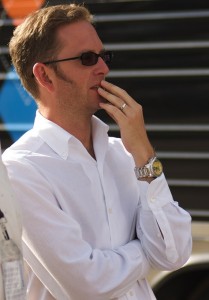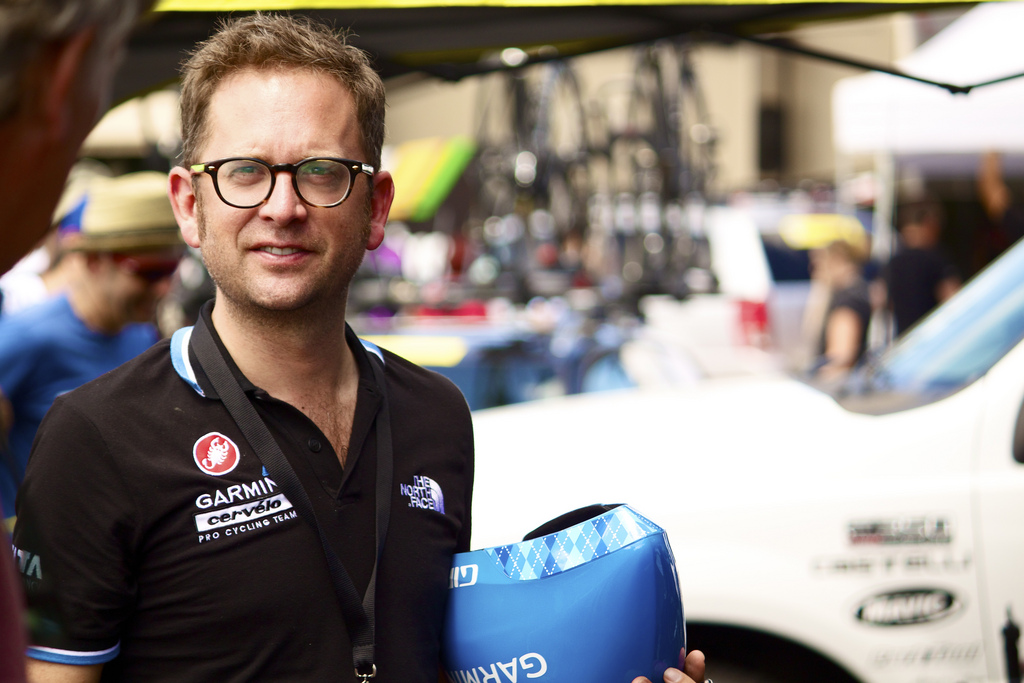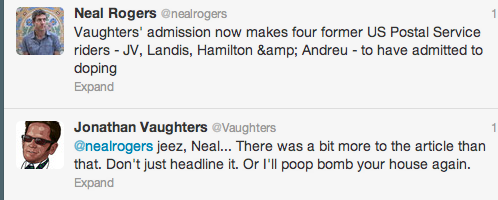By now, most people who care about these things have read Jonathan Vaughters’s New York Times op-ed, “How to Get Doping Out of Sport,” in which the former Tour de France rider confesses to doping during his professional cycling career.
As an argument for why the war against doping is worth fighting, it’s an exceptional piece. I hope that it will be widely read, especially by those who say that “everyone’s doing it” and therefore the easy solution is to just legalize drugs. The essay is also a powerful counter-argument to those who acknowledge cycling’s dirty past, but insist that it’s time to “just let it go.”
But as a confession, Vaughters’s essay is a self-serving pile of PR—a textbook example of how public figures use the media to cultivate their images and influence the stories that get told.
Vaughters retired at the end of 2003, and his doping history has been an open secret for some time, because he’s made a point of evading doping questions not with denials, but with vague hints, like the one he gave John Henderson of the Denver Post. “I’m not here to talk about my past. You can read into that anything you want.”
So why confess now? Because the U.S. Anti-Doping Agency is proceeding with a case against Lance Armstrong, which accuses Armstrong and his associates of a conspiracy to promote systematic doping. It’s been reported that Vaughters was one of the former Armstrong teammates who offered testimony in the case. As the case moves forward, Vaughters’s secret will out.
The New York Times piece was Vaughters’s chance to own the narrative. And in his telling, he’s not a lying cheater, he’s a victim of lax anti-doping rules that forced him to choose cheating. He was an awkward kid (with a Goofy alarm clock!) who just wanted to live his dream. His transformation into a doper wasn’t a moral failing, a lapse of judgement, or a choice to place winning ahead of fairness or truth. No, his decision to dope was a result of ambition, “a trait we, as a society, generally admire.” That’s right, it was his inherent goodness “in a world where rules aren’t enforced” that made him do it.
screenshot: Vaughters scolds VeloNews reporter Neal Rogers for veering from his carefully crafted narrative.
In 2003, I interviewed Vaughters for a Bicycling article about doping. “People tend to forget that this is how cyclists earn a living,” Vaughters told me. “People in mainstream jobs drink four cups of coffee to be prepared for their 8 a.m. meeting–it’s the same thing.” Got that? Sometimes drugs are necessary to make money at your job. “If everyone is doing the exact same thing, then even if it’s technically outside the rules, it’s not giving anyone an advantage,” he told me. “Was taking EPO cheating in the pre-Festina era of cycling? At that point in time you had such widespread use of EPO that perhaps it shouldn’t be considered cheating.”
That interview was my introduction to the mindset of dopers and their self-justifying excuses—it’s not cheating if everyone’s doing it. They can convince themselves that everyone’s doing it, because a culture that insists that cheating is obligatory for success becomes self-perpetuating—everyone in the sport really is doping, because the dopers are the only ones left. The people who refuse to cheat never reach the top echelon. And it’s those athletes who would sooner abandon their sport than dope who are the true victims here.
To his credit, Vaughters seems to have decided that yes, taking EPO was cheating, and he acknowledges doping’s invisible victims in his piece. “And think about the talented athletes who did make the right choice and walked away,” he writes. “They were punished for following their moral compass and being left behind. How do they reconcile the loss of their dream? It was stolen from them.”
But what Vaughters fails to acknowledge is that he was one of the thieves. The moment that he chose to participate in a corrupt system he became part of the problem.
I’m glad Vaughters is supporting the fight against doping. His intentions seem genuine, and I hope he’ll continue. But doing so doesn’t let him off the hook. As I argued in an NPR commentary a few years ago, doping will continue as long as its benefits outweigh the harms. And when you take a close look at Vaughters’s career, it’s hard to detect many harms. Yes, he retired at 29, but he’d already spent a full decade as a pro.
 All things considered, doping seems to have paid off handsomely for Vaughters. It helped him win records and prizes on the race circuit, and that gave him the name recognition he needed to build a successful team franchise. He has made a fair sum of money along the way. As a cautionary tale against doping, his story holds little power.
All things considered, doping seems to have paid off handsomely for Vaughters. It helped him win records and prizes on the race circuit, and that gave him the name recognition he needed to build a successful team franchise. He has made a fair sum of money along the way. As a cautionary tale against doping, his story holds little power.
By waiting until now to fess up, Vaughters confirms that he continued to choose his own ambitions over the core values he was espousing. Rather than risking his own reputation or his relationship with those who protected the doping culture, he used the status that he’d achieved by cheating to build his program (and his salary). He may as well have used money stolen from little old ladies to fund a crusade against purse snatching.
But the fundamental problem with Vaughters is that he gives himself and other dopers a free pass. “Obviously my approach has not been judgmental to the past, as evidenced by fact that David Millar is on our team. Our team has never condemned anyone,” he told VeloNews reporter Neal Rogers in 2010. David Millar is a British cyclist who served a two year ban for taking EPO. After initially denying, Millar confessed and has been an outspoken critic of doping ever since. He is working toward redemption, which is fine and great.
But it’s puzzling that a team supposedly set up to value clean sport over winning would be the one to give a doper a second chance. Think about the message that sends. Doping is bad, but if you do it and get caught and then promise not to do it again, it’s all good.
What Vaughters seems unwilling to acknowledge is that unless doping has consequences, there’s really no incentive not to do it. How does he expect to change the culture of sport without holding cheaters responsible? People like Vaughters and Millar (and Thomas Dekker, another former doper that Vaughters hired for his “clean” team) surely have a place in the anti-doping fight, but not as role models.
Vaughters is probably right that the culture of cycling is starting to shift. The fact that he now feels safe to confess is likely a testament to the work that USADA has done to protect clean athletes from bullying by powers hellbent on protecting the doping culture. Some have suggested that it’s time for cycling to convene an independent truth and reconciliation committee, and Vaughters offered his support for such a plan in a tweet a few days ago. It’s an excellent idea—one that could begin with Vaughters himself.
This is an opportunity for Vaughters to take actions that match his words. Tell us exactly when your doping began, what you did, and which seasons you doped–then remove your name from those ranks. Give back the ill-gotten prizes. If that Mont Ventoux ascent record you set was done on dope, give that back too. Stop excusing your wrong choices and start owning them. Now is your chance to show your true character.
***
Images: Jonathan Vaughters holding a helmet by rcrhee
Vaughters with his watch by fsteele770


Jonathan Vaughters’ op-ed reminds me of his “open letter to Roger Legeay” who was the manager of Credit Agricole, the team he retired early from.
For those who are not familiar, in his AIM transcript Vaughter expressed surprise that upon joining the team, he found that team didn’t use dope.
https://m.espn.go.com/wireless/story?storyId=8152602&wjb=&pg=2
It is good that Vaughters had come forward to USADA, that puts him ahead of many others. But you are absolutely right that significantly more disclosure is needed.
I would imagine that Vaughters has to be very careful about the detail that the writer’s calling for, giving that he seems to be one of the witnesses who’s provided the relevant detail to the USADA in the Amstrong etc case – sub judice.
I very much doubt if USADA or other anti-doping authorities would thank him if he started naming names in public in advance of certain forthcoming hearings. If he doesn’t name names at those hearings, then you would have a point.
As for the “second chances” complaint, what stance precisely do you expect a repentant doper to take? That repentant dopers should be cast into the outer darkness? Come off it. What’s more, as a repentant doper who was never caught he’d be well aware that the former dopers caught and suspended were only the tip of the iceberg. There is practically no cyclist who has been around more than a few years who can’t be six degrees of Kevin Baconed to a doping scandal.
Is it that you want a “clean team” to accept riders who may well have been on the hot sauce but were never caught and give the cold shoulder to those who were? Or is it that you want them to only hire kids? How viable do you think that is at the pro level?
What’s more, if Vaughters himself shouldn’t be the man to set up a “clean team” who should it be? There doesn’t appear to have been a line of people trying to do it back when he set up slipstream, was there?
Two points.
First, when talking of ex-dopers who admitted having cheated and returned, you make a mistake judging JV. He and his team fight doping. That’s ok. If you are an ex-doper and you ride back, you declare yourself clean – it’s ok. Everyone makes mistakes. Now, what JV suggests – strengthen antidoping rules so that nobody will be taking the risk of doping. What’s the point of taking if you know you’ll get caught?
The message is simple – “people make mistakes, look, they did and now can be fair cyclists. Don’t let others do it.”
Second. Yes, we may aks riders to tell when they doped. Ok, take Vaughters’ record on Mt. Ventoux. What about Iban Mayo, whose record is now unbeatable? He cheated, everyone knows it. Then, what about Bjarne Riis? He admitted too. Start stripping riders from titles. But who will get them? The guy who finished 100th? What is the point of taking back the prizes and titles?
Wouldn’t it be more proper to ask cyclist to admit? With no consequences? Imagine, riders all say what they did and how. We finally get to know everything. And we leave it. We strenghten antidoping rules to never let it happen again. And everyone knows how it was in the past. We are aware and we want to build clean cycling. Beautiful, huh?
But coming down to earth, we would need UCI and WADA to get involved in such an event. That’s not possible. And this is the reason why the doping cases will last years – an enormous hang-over for cycling world. And that’s sad.
Jonathan Vaughters is right.
There needs to be some type of financial claw-back for dopers. AND they need lifetime bans from the sport AND cycling industry. So you dope for 10 years, never get caught then live off the royalties of your doping years for the rest of your life? That sends the WRONG message to youngsters all over the world. Perhaps 70% of all winnings and sponsorship / endorsements / pay go into a retirement type annuity fund for the riders. The fund gets paid out over 20 years AFTER retirement. If at any point and time they are busted for doping (including any frozen or stored samples) 100% of the balance of their account goes toward the research, development and administration of doping tests and controls at all levels of the sport. Do this along with the lifetime ban and the sport will get clean VERY quickly.
Sure, doping must have negative consequences to incentivise people not to do it. But surely coming clean must also have positive consequences, otherwise there’s no incentive to do that either?
Offenders who display good behaviour get parole. Maybe refomed ex-dopers should be entitled to something similar, provided of course that they truly are doing good and helping to get rid of the problem. I don’t think expressing regret is enough though. We all express regret at bad decisions we’ve made. But isn’t Vaughters doing more than just talking the talk by establishing and promoting a clean team and, presumably, spilling the beans on Armstrong to the authorities?
“That interview was my introduction to the mindset of dopers and their self-justifying excuses—it’s not cheating if everyone’s doing it. ”
Well, there is the difference between ethics, the law, and morality.
For a trivial example, it is illegal to travel over the speed limit in the USA. We’re supposed to think doing illegal things are wrong. However, it is widely considered ethical to travel the speed limit + some nominal value (locally, the cops won’t pull people clocked at less than 10mph over the limit), because the law isn’t ordinarily what determines conduct in social groups. Most people look on traveling 60mph over the speed limit as unacceptable behavior–it is unethical.
Note that morality (your internal compass) really didn’t have much to do with that conversation. You can think it is wrong (immoral), and you may not speed as a result (which would set you apart from your community), but it is perfectly ethical to speed moderately. You may make a choice based on your morals not to disobey the law, but ethics are a community-centered standard, not an individual one.
Outside of a community (which defines its own ethics), the ethics may shift. To use another trivial driving example, it is considered fine to jump lights in NYC (anticipate the green a bit), and in Denver, it is considered okay to push reds (clear the intersection at speed as the light changes). It is when one culture/community interacts with the other that the problems come up.
For professional European road cyclists, it was probably ethical to dope. It was part of the job, regardless of whether it was formally not allowed. The rules != ethics.
Cheers,
Will
William M. deRosset
Fort Collins, CO
JV is such sleezy, slippery, character, he reminds of Gollum the creature from the Lord of the Rings, always lurching in the dark corners with that smile never to be trusted. How convenient and timely for him to finally come out and admit what a doper he was after having testified against Lance, and receiving immunity. He keeps all his winnings, money, records, and continues with his phony assemblage